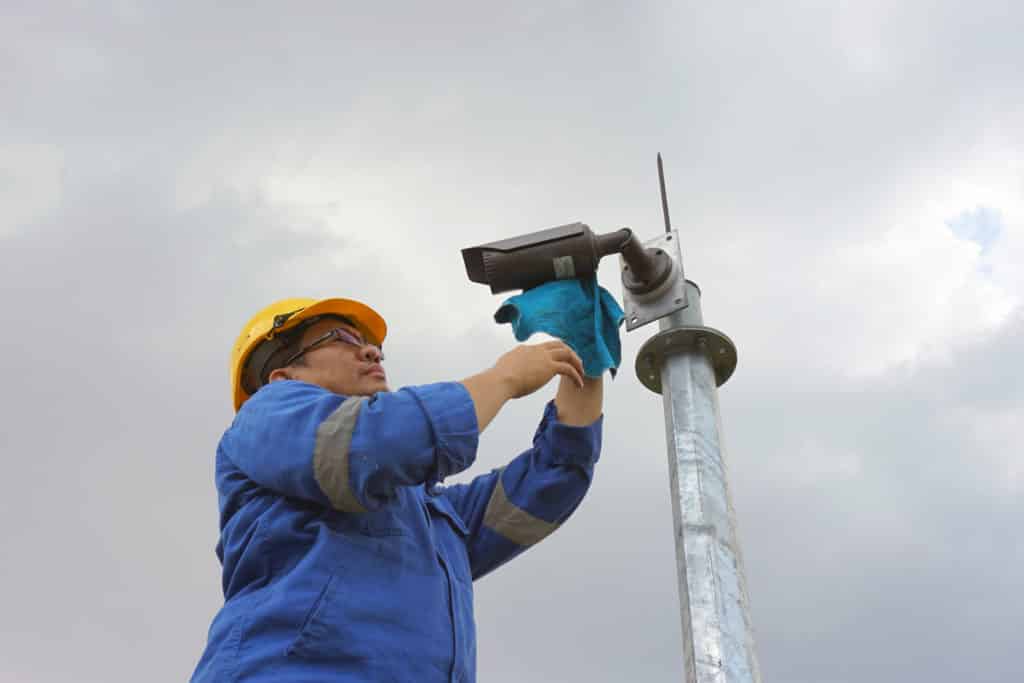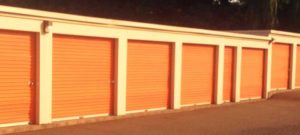We can’t think of a single piece of equipment that doesn’t require maintenance. That includes the commercial security system at your business. Typically, these units are fairly maintenance free. But there is one thing you should do periodically: Keep your security camera lens clean.
Why should you clean your surveillance cameras? Cleaning your security camera lens is important for maintaining your overall surveillance system. Over time, dirt, dust, smudges, animal debris, and more can accumulate. A dirty camera lens reduces the image quality of the video you’re trying to capture. So, what can you do to maintain the effectiveness of these essential tools? How can you clean your camera and lens?
This blog will answer some of the most typical questions around how to clean your outdoor security camera lens.
Why is it Important to Clean Your Security Camera and Lens?
Your cameras can fall victim to dust, dirt, cobwebs, and weather. Cleaning your security camera lens will ensure years of foolproof service. Clearing the housing from any debris while carefully cleaning the surveillance camera lens will ensure a crystal-clear picture of your property at all times.
If your camera is outside, environmental conditions can smudge up the lens and obscure your vision. Dust is still probably the top lens smudger on the outside of your business. However, mud, leaves, bugs, and even raindrops can hamper observation. This could affect not only the picture but the analytics running behind your smart camera lens. While a few stains may not seem like a big deal, over time, it creates a cumulative effect until vision is obscured.
If you’ve ever seen a bird nesting on a CCTV camera, you understand the conditions that could affect this equipment. Rodents and birds can find cable insulation a good nesting material. Spiders frequently build webs right over the housing of the camera. We’ve even seen bees and wasps building nests off the camera housing on a pole or the side of a building. In the winter, the warmth of a camera can be an attractant to these creatures.
Making matters worse, even modern smart cameras are particularly vulnerable to these encroachments. For example, a zoom lens could end up focusing on the spiderweb over the lens instead of the external shot of your business. Light from the ring of the camera’s infrared illuminators can reflect visual information back to the software improperly if there’s an accumulation of dirt on the camera housing. These cleaning tips also apply indoors, although the four walls do provide a measure of protection against critters, rain, and other elemental conditions.
The benefit of cleaning your security camera lens is that when you need them the most, they’ll be there for you. You are placing a lot of faith in these tools. A good security system pays for itself every day. However, you as the owner must take steps to clean the surveillance camera lens on every unit regularly to keep them in tip-top shape.
So, let’s look at some of the main reasons why you should clean your camera and clean your camera’s lens, and then look at how to clean cameras and some pro tips to ensure longevity.
Top 5 Reasons to Clean Your Security Camera Lens
-
Reduced Glare and Flare: Dirty or smudged lenses can cause glare, lens flares, and unwanted reflections in your videos, particularly when shooting in bright light. Cleaning your lens helps minimize these distractions and ensures your shots are visually appealing.
-
Color Accuracy: A clean lens helps maintain accurate color representation in your videos. Dirty lenses can affect color balance and introduce unwanted color shifts, which can be challenging to correct during post-production.
-
Enhanced Low-Light Performance: Clean lenses improve the camera's low-light performance, allowing it to capture better quality footage in challenging lighting conditions. Dirty lenses may scatter light, reducing sensitivity and making it harder to record without noise or artifacts in low light.
-
Longevity and Equipment Maintenance: Cleaning your security camera lens is essential for prolonging the lifespan of your video equipment. Over time, dust and debris on the lens can infiltrate the camera internals, potentially causing damage. Cleaning the security camera lens reduces the risk of contaminants affecting the camera's sensitive components, including the sensor.
How Often Should I Clean My Surveillance Cameras?
You should clean your security camera lens on each unit at least every three or four months. Clean your CCTV cameras more often if they’re exposed to serious weather and you notice problems with the visuals you’re capturing.
Another tip to consider is to look at the conditions surrounding the CCTV camera as you’re cleaning it. Specifically, are there external conditions that could block your visual feed? Does shrubbery need to be cut back from summer growth? Does the camera angle need to be changed slightly? Look at the images produced by each camera to determine a) If it’s clean; and b) If it’s still producing the right visual you need.
How to Clean Security Cameras
Cleaning a dome camera lens is different from cleaning a box camera. Both require careful dusting with a soft brush, an air can, and a microfiber cloth. Here’s how to clean the security camera lens on both of these types of installations.
See How Simple It Can Be To Secure Your Business.
How To Clean a Dome CCTV Camera Lens
If your cameras are hard-wired, start by shutting off the breaker to the cameras, just to be safe. If you have a traditional dome surveillance camera, you must carefully clean inside and out with a dry soft brush or a can of compressed air. A microfiber cloth also works well and doesn’t scratch the lens. You can also use a commercial security camera lens cleaner made for this process.
If there’s dirt on the dome camera, it can cause the autofocus to concentrate on the dome itself and not the video beyond it. You’ll see this as an out-of-focus image. If there’s a lot of dirt or debris on the outside of the dome, gently use the soft brush to whisk it away. You can use compressed air as long as you’re careful to put the spray nozzle too close to the camera. This could actually push the debris into the camera and scratch the lens.
Start the cleaning process by gently removing or opening the dome housing. Use the microfiber cloth to carefully remove any dust or dirt. Don’t use paper towels. Just like they’ll scratch the lenses of your glasses, they can also damage the camera’s vision. Instead, try putting a few drops of the lens cleaning solution on the microfiber cloth. Ensure the cloth isn’t saturated. Excess liquid can seep into the camera’s internal parts and damage it. Gently wipe the camera lens in a circular motion. Start at the center of the lens and work outward. Do this gently; excessive pressure can scratch the lens.
Inspect for spider webs, eggs, or any rodent damage. If marks persist, repeat the process. Close the housing and you’re good to go. But don’t forget to turn the power back on.
How To Clean a Box Surveillance Camera Lens?
To keep these CCTV cameras clean, you should again, rely on your air can, soft brush, and microfiber cloth to brush off the equipment. If the camera is muddy or greasy, you can use a little warm soapy water on the cloth itself to wipe it down.
Again, safety first. Shut down the breaker to your hard-wired cameras as a first step in the cleaning process. Many outdoor box cameras also have a fan or even a heater, depending on where they are located. Some units can open, so inspect the interior for insect eggs and bugs during that process. If you spot dangerous insects such as bees or wasps, consider calling an exterminator to reduce your injury risk. While you’re cleaning the security camera lens, take a look at the wiring. Is the insulation intact? Are the wires exposed? Is anything fraying or cracked?
If the cameras are wireless IP security cameras, you can skip this step.
What Kind of Regular Maintenance Does a Security Camera Need?
Regular maintenance for your security cameras is essential to ensure they function effectively and provide reliable surveillance throughout the year. The specific maintenance needs may vary depending on the type of cameras, their location, and environmental conditions.
However, there are some general guidelines for maintaining your security cameras. While this guide is primarily written for commercial security systems, all of the tips below apply just as much to home security systems. So if you want to use this guide to learn how to clean inside your Ring camera lens, go for it!
-
Clean the Security Camera Lens
Regularly clean the camera lens to remove dirt, dust, smudges, and other contaminants that can degrade image quality. Depending on your environment, you may need to clean the lens monthly or as often as necessary. Cleaning inside the camera lens is not recommended unless absolutely necessary, since the inside is usually sealed and very sensitive. If you must clean inside the camera lens, hire a professional.
-
Check Camera Positioning
Periodically inspect the camera's position and angle. Ensure it's still capturing the desired area and hasn't been accidentally bumped or shifted. Adjust the camera angle if necessary to maintain optimal coverage.
-
Inspect Cabling and Connections
Check the cables and connections for signs of wear, damage, or loose connections. Rodents sometimes chew through outdoor connection points. Even weather can eventually cause degradation. Faulty cables or connections can result in video loss or intermittent issues. Replace or secure connections as needed.
-
Clean Surrounding Areas
Keep the area around the camera clean and free of obstructions. Trim overgrown vegetation, clear away spider webs, and ensure no obstacles are blocking the camera's view.
-
Monitor for Condensation
If your security cameras undergo temperature variations, monitor them for condensation, especially in outdoor environments. Condensation can affect the camera's performance. Use desiccant packs or consider investing in weatherproof camera housings.
-
Update Firmware and Software
Regularly check for firmware or software updates provided by the camera manufacturer. Keeping your camera's software up to date can enhance its performance, security, and features.
-
Inspect Infrared (IR) Illuminators
If your cameras have infrared (IR) LEDs for night vision, ensure they function correctly. Check for any burned-out or malfunctioning IR LEDs and replace them as needed to maintain clear nighttime surveillance.
-
Review and Back Up Footage
Periodically review and back up recorded footage. This process ensures that you have a record of events, and it helps prevent your storage from becoming full. If you’re storing camera footage in the cloud, you can skip this step.
-
Check Power Supply
Examine the power supply and connections to ensure they are secure and functioning correctly. Unless you’re using solar or fully battery operated video surveillance, power issues can disrupt camera operation.
-
Test Motion Detection and Alerts
Regularly test the motion detection settings and email or push notification alerts if your cameras support them. Make sure you receive alerts as expected and that the motion detection is properly calibrated.
-
Inspect Housing or Enclosures
For outdoor cameras, check the housing or enclosure for damage or cracks. Weatherproof housings can deteriorate over time, and it's important to maintain their integrity to protect the camera from the elements.
-
Consider Professional Maintenance
Depending on your system's complexity and size, it may be wise to schedule periodic professional maintenance and inspections. DIY is great if you have the time. However, professional maintenance helps identify potential issues and ensure your surveillance system's long-term reliability.
-
Document Maintenance
Whether DIY or relying on a pro, keep a record of your maintenance activities, including the dates of last cleaning, adjustments, and any issues encountered. This documentation can help you track the camera's performance over time.
Is There an Alternative to D-I-Y Surveillance Camera Cleaning?
The worst crisis can stem from equipment that fails when you need it the most. Video surveillance cameras are relatively low maintenance. However, regular maintenance is essential on any equipment, including your video surveillance system. To keep your security cameras in optimal working condition, clean the security camera lens on each unit regularly. A well-maintained surveillance system provides peace of mind and ensures that it continues to fulfill its intended purpose of monitoring and protecting your property. Tailor your maintenance routine to your specific cameras and environment to maximize their longevity and effectiveness.
We know keeping your CCTV cameras clean and functioning can be a hassle. So, instead of Googling “How to clean my camera,” ask yourself, “do I want to handle all this security camera cleaning business myself?”
Pro-Vigil is a top provider of modern smart surveillance security infrastructures. We are proud to support our clients with the full package of security assessment and design, efficient installation, and long-term maintenance. Contact our team if you’re looking for a full-service solution to keep your business safer. We can help.











